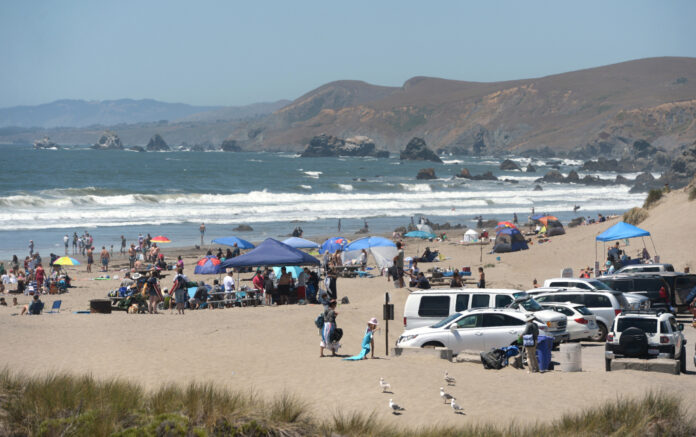With the number of new COVID-19 infections rising in Marin and throughout the state, health officials Tuesday announced a new emphasis on enforcement of rules designed to slow down spread of the virus.
“We now have a way for citizens to report any violation of the shelter-in-place order that they see,” Dr. Matt Willis, Marin County’s public health officer, told county supervisors at their weekly meeting. The email address is [email protected].
“That is an email address where anybody can briefly describe the nature of what they see as the nature of the infraction,” he said.
By early afternoon Tuesday, 30 violations had been reported, said Marin County Assistant Administrator Angela Nicholson.
The violations cited included businesses not enforcing social distancing and mask wearing, short-term rentals operating without authorization and individuals not wearing masks while walking on outdoor paths, Nicholson said.
County officials will meet on Friday to discuss what type of action it will take if it confirms that violations have occurred. Nicholson said since the shelter-in-place order went into effect in March, the county has had the authority to fine people up to $1,000 per violation.
Seaplane Adventures, a Mill Valley sightseeing business, stopped flying over a week ago after the Marin County Sheriff’s Office responded to citizen complaints by threatening to fine the business $1,000 per flight if it continued operations. Up until now, county officials had advised anyone seeing a violation to call the sheriff’s department.
Mimi Willard of Kentfield, one of the members of the public to comment during the meeting, said the emails reporting violations need to be monitored and responded to in real time.
“Suppose that a person observes an event that should have immediate attention such as a large party,” Willard said.
Nicholson said the state left the county little choice but to get more involved in local enforcement.
“The state was very clear,” Nicholson said, “that they were starting an enforcement effort and that if the county didn’t have an enforcement methodology in place they would potentially not give us CARES Act funding.”
The federal Coronavirus Aid, Relief and Economic Security Act sent $150 billion directly to state and large local governments nationwide to cover costs related to the contagion. California received $9.8 billion, and cities and counties in the state with more than 500,000 residents got about $5.8 billion.
However, jurisdictions with smaller populations, such as Marin County, did not receive a direct allocation from the federal government. They rely on the state sharing some of its $9.8 billion to help cover their pandemic costs.

Willis told supervisors, “If there are themes, especially around a given business, that is something we can send up to a newly established state strike team.”
Willis said the strike team has considerable enforcement power since it includes representatives from various state regulatory agencies that oversee businesses such as the Department of Alcoholic Beverage Control, which issues liquor licenses to restaurants and bars, and the state Board of Barbering and Cosmetology.
“This strike force got its start on July 3,” Willis said, “and in just the first two days they cited 54 businesses statewide. They’re moving across different communities starting in those counties that are on the state’s watch list.”
On July 3, the strike team ordered at least a dozen Santa Clara restaurants to close.
“The reality here,” Willis said, “is that the governor has recognized that just in the last two weeks there has been a remarkable increase in incidents across the state of California and that some of that may have resulted from the pace at which things opened.”
Willis said Marin has been seeing more and more cases on average each day, recording record high numbers on two or three days in the past week.
“That is happening nationally and across the state and the region,” Willis said.
On Monday, Marin had 1,809 confirmed cases of COVID-19, an increase of 120 since Friday. Tuesday recorded 1,856 cases. There were 26 people being treated for coronavirus in Marin hospitals, down from a high of 35 last week.
Eight of those being treated were inmates at San Quentin State Prison, where there were 1,440 active COVID-19 cases in custody as of Tuesday. Seven of those inmates were in intensive care. So far, 10 inmates have died.
Willis said as a result the state has taken greater control over counties’ “shelter-in-place” orders. Last week, due to its high rate of new infections, Marin was placed on a watch list of counties that are being monitored closely by the state. About 80% of Californians live in one of the counties on the list, Willis said.
As a result of being placed on the watch list, the state required Marin to close indoor offices for non-essential businesses, indoor malls and hair salons on Monday. The state ordered the county to close indoor dining last week.
Willis said state officials have told Marin not to open any new business sectors until they give the green light.
“So,” Willis said, “we are in a holding pattern.”






